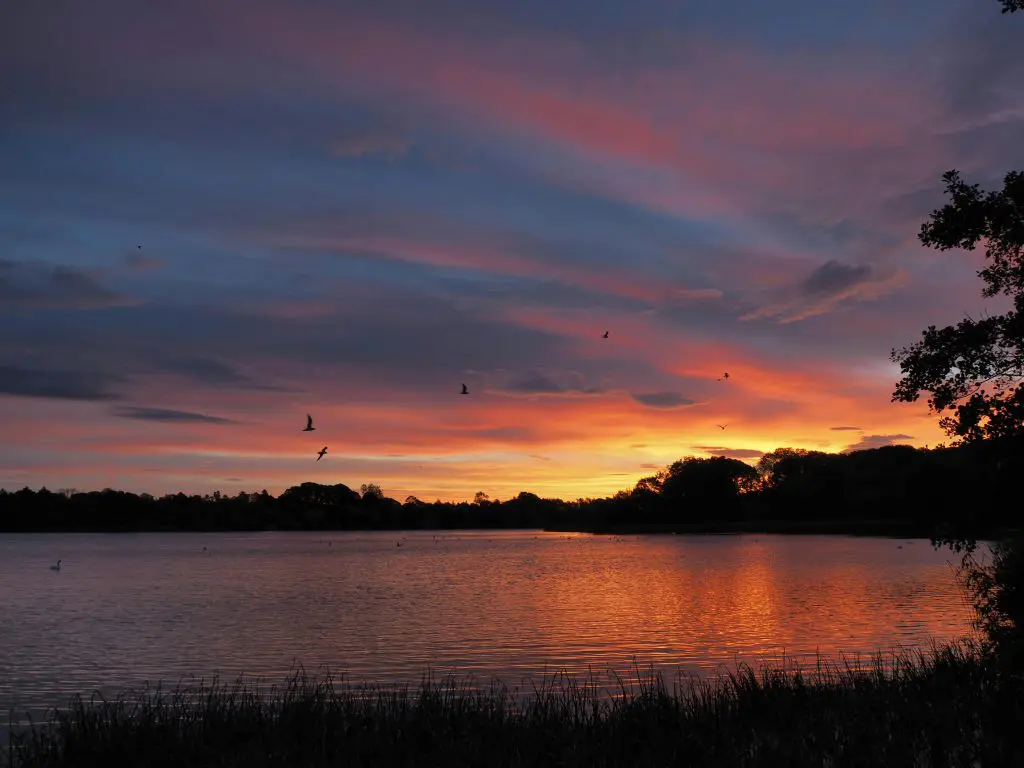
Bathing Ban at Benone Strand Due to Blue-Green Algae: What You Need to Know A bathing ban was introduced at Benone Strand, a popular beach on Northern Ireland’s North Coast, over the August bank holiday weekend due to the presence of potentially toxic blue-green algae. The ban, announced by the Department of Agriculture, Environment and […]
A bathing ban was introduced at Benone Strand, a popular beach on Northern Ireland’s North Coast, over the August bank holiday weekend due to the presence of potentially toxic blue-green algae. The ban, announced by the Department of Agriculture, Environment and Rural Affairs (Daera), follows detection of high levels of algae in routine water samples taken on Thursday 21st of August.
Update: the temporary ban was lifted on the 28th of August after tests confirmed that blue-green algae is no longer a risk to public health. Temporary signage advising beachgoers not to enter the water has now been removed. While the situation at Benone has improved, officials are urging the public to remain cautious and check the NI Bathing Water Quality Dashboard and local signage for real-time updates before swimming.
Blue-green algae, or cyanobacteria, are microscopic organisms that naturally occur in freshwater and coastal environments. While not always harmful, certain blooms can produce dangerous toxins that pose health risks to humans, pets, and wildlife.
These organisms thrive in warm, nutrient-rich, and still waters, especially under prolonged sunlight. When conditions are right, they can form thick, green blooms or scums on the water’s surface.
Rising global temperatures are not only warming the oceans but also inland water bodies, creating ideal conditions for blue-green algae. Warmer water holds less oxygen and favours the rapid growth of cyanobacteria, while increased rainfall from extreme weather can wash more nutrients into waterways. This amplifies the frequency and intensity of harmful blooms.
Exposure to high levels of blue-green algae can result in:
Skin irritation, rashes, or allergic reactions
Respiratory issues from inhaling water droplets
Gastrointestinal symptoms, such as nausea, vomiting, and diarrhoea, if contaminated water is swallowed
Pets and livestock are particularly vulnerable and should be kept away from affected water.
Daera confirmed the ban after routine monitoring detected elevated levels of blue-green algae in the water at Benone Strand. The agency has issued an “advice against bathing” notice to the Causeway Coast and Glens Borough Council, which manages the beach.
A red flag was displayed at the site, and RNLI lifeguards broadcasted audio messages warning against entering the water. While some beachgoers have still been spotted entering the water, authorities urge the public to comply with past and future potential bans for their safety.
“It’s really, really sad that this is occurring, particularly on a bank holiday weekend,” said Northern Ireland’s Agriculture and Environment Minister Andrew Muir. “The people of Northern Ireland deserve better than bathing waters being closed and Lough Neagh being in this situation.”
According to Daera, no other beaches on the North Coast are currently affected. However, monitoring will continue, and further advisories will be issued if needed.
The presence of algae at Benone is not entirely surprising, as Lough Neagh, which has suffered repeated blue-green algae blooms, drains into the Lower Bann, which flows north to the coast. Experts have described the situation as the result of a “perfect storm” of environmental conditions, including agricultural runoff, sewage, and climate change.
Lough Neagh’s situation has become a case study in environmental mismanagement. As the largest freshwater lake in the UK, its continued decline is a red flag for other regions facing similar pressures. Experts warn that without coordinated, multi-sector action, other lakes and rivers could face the same fate.
Blue-green algae has been detected over 100 times across Northern Ireland this year. Most sightings have been in Lough Neagh, the Lower Bann, and Lough Erne. These blooms are linked to excess nutrients in the water, primarily phosphorus and nitrogen, originating from agriculture, wastewater, septic tanks, and industrial pollution.
Minister Muir has urged his Executive colleagues to back stronger environmental regulations, including:
Tighter controls on slurry and fertiliser use
Enhanced sewage management
Strengthened environmental governance
Support for climate action
“I’m giving my heart and soul to turn the situation around,” he said. “But I need full support from the Executive.”
Although swimming was temporarily prohibited, Benone Strand remains open for non-water activities. You can still:
Walk along the stunning coastline
Enjoy a beach picnic
Watch seabirds and other local wildlife
Before visiting any beach, especially during warmer months, check for local advisories from Daera or your local council. If you or your pets come into contact with water suspected to contain algae:
Rinse thoroughly with clean water and soap
Monitor for any signs of illness
Seek medical or veterinary advice if symptoms appear
The bathing ban at Benone Strand is a necessary public health measure, and while disappointing during a holiday weekend, it highlights the need for ongoing environmental efforts. Stay alert for updates from local authorities and follow guidance to protect yourself and others.
At All-Ireland Sustainability, we’re committed to building a greener, fairer island, together. Stay informed on the latest environmental initiatives, community action, and policy developments shaping sustainability across Ireland, North and South.
👉 Sign up for our newsletter today and be the first to hear about upcoming events, expert insights, and ways to get involved.
Whether you’re a seasoned advocate or just starting your journey, new members are always welcome.
Subscribe now and be part of the All-Ireland Sustainability network.